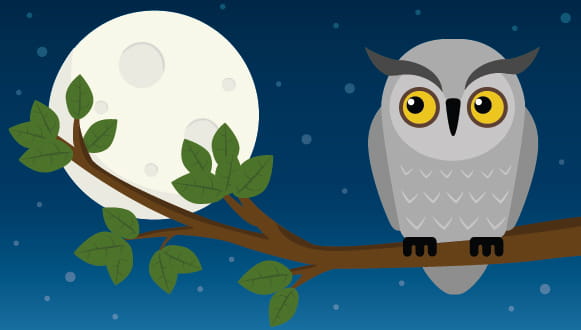You're up late in the evenings — often into the next morning. You need an alarm clock to help you get out of bed at a "decent" time in the morning. And it takes a coffee or two (okay, maybe three) to shake off the grogginess you feel after waking up.
You're a night owl — or so you've been called by your friend who almost always clocks out of your evening hangout as soon as the sun starts going down.
Night owl vs. morning person. Is there really a difference? And is staying up late really as bad as some people make it out to be?
Whether you're curious about what it means to be a night owl, or just an envious morning person in search of answers, Dr. Doha Ayish, neurologist at Houston Methodist, is here to explain what makes a night owl a night owl, as well as why being a night owl comes with both advantages and disadvantages.
What makes someone a night owl?
We all have an internal clock that helps control many aspects of our lives, including our sleep/wake cycles. This clock primarily runs in sync with ambient light, and it's why we're sleepiest when it's dark outside and most alert during the daytime.
However, your internal clock is influenced by several other cues, too — which can allow for some pretty significant variation in the pace of your internal clock compared to someone else's.
If you're a night owl, some behaviors, such as consistently eating late dinners or exposing yourself to bright non-ambient light in the evening, may have helped train your internal clock to shift a bit later than normal. But, being a night owl may also just be in your genes.
"A recent study has actually shown that a genetic change in a gene called CRY1 is common among people who have a condition called delayed sleep phase disorder, or DSPD," explains Dr. Ayish. "People with delayed sleep phase disorder have an internal clock that runs behind — causing them to wake up later in the morning than usual and go to sleep much later into the evening than most."
But is being a night owl bad?
While you may feel like you're living your best life late into the hours of the night, being a night owl does, unfortunately, come with a few downsides.
Whether due to your work schedule or parenting obligations, most night owls still have to get up early in the morning — which translates into a lot of night owls not getting enough sleep.
"Disturbing your sleep pattern can have obvious effects on your energy level during the day, but it can also have hidden effects on your overall health. For instance, sleep disturbances can increase your stress level and cause irregular heartbeats," warns Dr. Ayish.
In fact, a 2018 study analyzing the relationship between bedtime habits and health in almost half a million adults found that night owls are at more at risk for developing diabetes, when compared with individuals who identified as morning people.
These sleep disturbances can have other consequences, too. Night owls who have delayed sleep phase disorder may also suffer from sleep onset insomnia and morning sleepiness, both of which can cause sleep deprivation — ultimately resulting in mood problems, poor concentration, increased pain and even hallucinations, in some extreme cases.
"Then there's the more readily apparent downside to being a night owl: The fact that it can conflict with your family life or professional responsibilities," says Dr. Ayish. "Night owls have been shown to have poorer attention, slower reaction times and increased sleepiness throughout the day. While this is really only an issue for people who work during the day, it can affect any morning parenting obligations you might have, too."
But it's not all bad news for night owls.
"On the other hand, studies have revealed that night owls outperform morning people when it comes to creativity," says Dr. Ayish. "In addition, night owls benefit from the development of a nonconventional spirit and the ability to find alternative and original solutions."
And while it doesn't help when it comes to working a traditional 9 to 5 job, a lot of people argue that being most alert in the evening is advantageous, since a lot more can be done in the evening — when the daytime distractions and noise have quieted down.
Can a night owl become a morning person?
If you're a night owl, you probably don't look forward to a busy or early morning — but those mornings inevitably happen. And wouldn't it be great if they weren't so hard on you? It may leave you wondering: Can I force myself to become a morning person?
"For a night owl to become a morning person, he or she would need to make some pretty substantial lifestyle changes. It would take slowly shifting your sleep cycle, and consistently sticking with this new sleep cycle. It may also help to make sure you're getting plenty of exposure to ambient light throughout the day, as well as limiting exposure to bright non-ambient light in the evenings," explains Dr. Ayish. "However, a night owl who suffers from delayed sleep phase disorder may need to address his or her sleep condition before being able to successfully make a sleep schedule shift."


